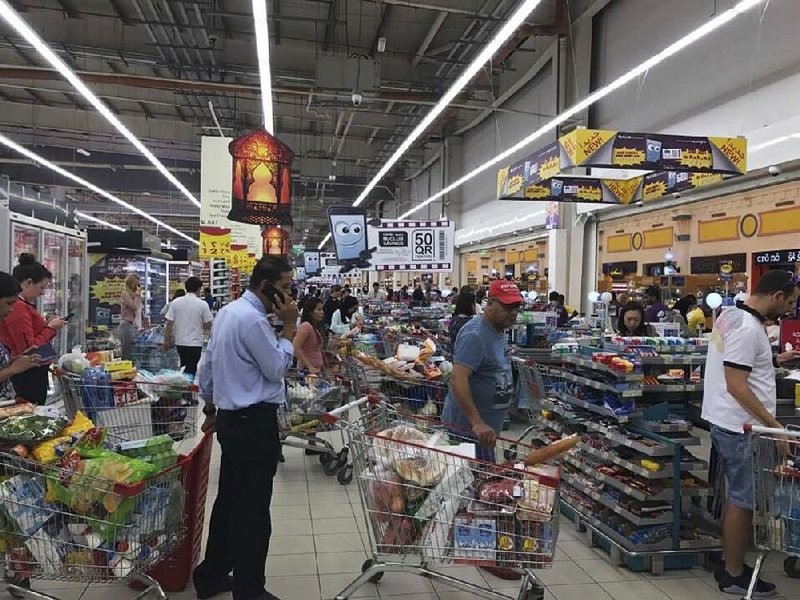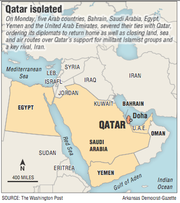RIYADH -- The U.S. said Monday that it will seek to defuse growing tensions between its energy-rich Persian Gulf allies after Saudi Arabia led a drive to isolate Qatar by cutting off air and sea transport and closing the tiny nation's only land border.
President Donald Trump wants to "de-escalate" the crisis and is committed to holding talks with all parties, White House spokesman Sarah Huckabee Sanders told reporters.
Earlier Monday, the Saudis and three regional allies -- the United Arab Emirates, Egypt and Bahrain -- suspended flights and sea travel to Qatar, escalating a week-old row and sending Qatari stocks plunging, though there's been no immediate impact on Gulf energy exports.
The decision to sever ties ignited the biggest diplomatic crisis in the Persian Gulf since the 1991 war against Iraq. The Arab powers, in explaining the move, pointed to the nation's support for terrorist groups and Iran.
The move came just two weeks after Trump visited Saudi Arabia and vowed to improve ties with both Riyadh and Cairo to curb terrorism and contain Iran. U.S. Secretary of State Rex Tillerson said the move was rooted in long-standing differences and urged the parties to resolve them.
Qatar, home to about 10,000 U.S. troops and the host of the 2022 FIFA World Cup, criticized the move as a "violation of its sovereignty." It long has denied supporting militant groups and described the crisis as being fueled by "absolute fabrications" stemming from a recent hack of its state-run news agency.
Saudi Arabia closed its land border with Qatar, through which the tiny Gulf nation and international travel hub imports most of its food, sparking a run on supermarkets.
Egypt, Bahrain, Saudi Arabia and the United Arab Emirates began withdrawing their diplomatic staff from Qatar, and regional airlines announced they would suspend service to its capital, Doha. Yemen's internationally backed government, which no longer holds its capital and large parts of the war-torn country, also cut relations with Qatar, as did the Maldives and one of conflict-ridden Libya's competing governments.
Saudi Arabia said the decision to cut diplomatic ties was due to Qatar's "embrace of various terrorist and sectarian groups aimed at destabilizing the region," including the Muslim Brotherhood, al-Qaida, the Islamic State extremist group and militants supported by Iran in the kingdom's restive Eastern Province.
Egypt's Foreign Ministry accused Qatar of taking an "antagonist approach" toward Cairo and said "all attempts to stop it from supporting terrorist groups failed."
The Gulf countries ordered their citizens out of Qatar and gave Qataris abroad 14 days to return home to their peninsular nation, whose only land border is with Saudi Arabia. The countries also said they would eject Qatar's diplomats.
The nations also said they planned to cut air and sea traffic. Doha-based satellite news network Al-Jazeera reported trucks carrying food had begun lining up on the Saudi side of the border, apparently stranded. The Qatar Stock Exchange fell more than 7 percent.
Qatar Airways, one of the region's major long-haul carriers, has suspended all flights to Saudi Arabia, the United Arab Emirates, Egypt and Bahrain until further notice. On its website, the carrier said the suspension of its flights would take effect today. Customers affected by the decision are being offered refunds.
The route between Doha and Dubai is popular among business travelers, and both are major transit hubs for travelers between Asia and Europe. Saudi Arabia said it would begin blocking all Qatari flights at midnight.
Qatar said there was "no legitimate justification" for the countries' decision, though it vowed its citizens wouldn't be affected by it.
"The government had already taken the necessary measures and precautions to ensure that normal life continues," a statement from the Qatari Cabinet said.
Saudi Arabia also said Qatari troops would be pulled from the ongoing war in Yemen.
Kuwait and Oman, which along with Qatar, Bahrain, Saudi Arabia and the United Arab Emirates make up the Gulf Cooperation Council, have so far maintained their diplomatic and commercial ties with Qatar. Both countries have shown reluctance in the past to follow Saudi Arabia in adopting a tougher stance against Iran.
Qatar's Foreign Minister Mohammed Bin Abdulrahman Al Thani said early today that Kuwait was trying to mediate and solve the crisis.
Al Thani said Kuwait's ruler had asked Qatar's ruling emir, Tamim bin Hamad Al Thani, to hold off on giving a speech about the crisis.
The foreign minister also told Al Jazeera that his nation rejected those "trying to impose their will on Qatar or intervene in its internal affairs."
Iranian Foreign Minister Mohammad Javad Zarif stepped into the fray Monday, saying on Twitter that "coercion" would not lead to a solution.
"Neighbors are permanent, geography can't be changed," he said.
U.S. response muted
Qatar is the site of the sprawling al-Udeid Air Base, home to the forward headquarters of the U.S. military's Central Command.
Maj. Adrian J.T. Rankine-Galloway said the U.S. military had "no plans to change our posture in Qatar."
"We encourage all our partners in the region to reduce tensions and work towards common solutions that enable regional security," he said in a statement.
In Australia, Tillerson said he didn't believe the diplomatic crisis would affect the war against the Islamic State in Iraq and Syria.
A Turkish official said President Recep Tayyip Erdogan is "actively involved" in efforts to resolve the diplomatic crisis. Deputy Prime Minister Numan Kurtulmus said after a Cabinet meeting that the government hopes Erdogan's initiative will help overcome tensions, although he provided no details.
"The Middle East is not at a point where it can endure a new crisis," he said.
FIFA, international soccer's governing body, said it was remaining in regular contact with Qatar, saying it spoke with local organizers of the 2022 World Cup. It did not elaborate.
Before Monday, Qatar had appeared unperturbed by the growing political tensions. On May 27 its emir, Al Thani, had called Iranian President Hassan Rouhani to congratulate him on his re-election.
The call was a clear, public rebuttal of Saudi Arabia's efforts to force Qatar to fall in line against Shiite-ruled Iran, which the Sunni kingdom sees as its No. 1 enemy and a threat to regional stability. Qatar shares an offshore gas field with Iran.
The crisis began late last month when Qatar said hackers took over the site of its state-run news agency and published what it called fake comments from its ruling emir about Iran and Israel. Its Gulf Arab neighbors responded by blocking Qatari-based media, including Al-Jazeera.
Qatar long has faced criticism from its Arab neighbors over its support of Islamists. The chief worry among them is the Muslim Brotherhood, a Sunni Islamist political group opposed to monarchical rule.
In March 2014, Saudi Arabia, the United Arab Emirates and Bahrain recalled their ambassadors from Qatar over that rift. Eight months later, they returned their ambassadors as Qatar forced some Brotherhood members to leave the country and quieted others.
Qatar denies funding extremist groups. However, it remains a key patron of the Islamic Hamas movement, which rules the Gaza Strip. Western officials also have accused Qatar of allowing or encouraging funding of Sunni extremists such as al-Qaida's branch in Syria, once known as the Nusra Front.
Many in Qatar expressed shock over the crisis, especially since it occurred during the Muslim holy month of Ramadan.
"Now is a time that we should be more united than ever," said Aamer Hassan, a Canadian living in Qatar. "I really do hope they find a solution."
Information for this article was contributed by Jon Gambrell, Aya Batrawy, Robert Burns, Maggie Michael, Reem Saad and staff members of The Associated Press and by Glen Carey, Zainab Fattah, Ting Shi, Yousef Gamal El-Din, Filipe Pacheco Zaid, Sabah Deena, Kamel Yousef and John Hughes of Bloomberg News.
A Section on 06/06/2017

